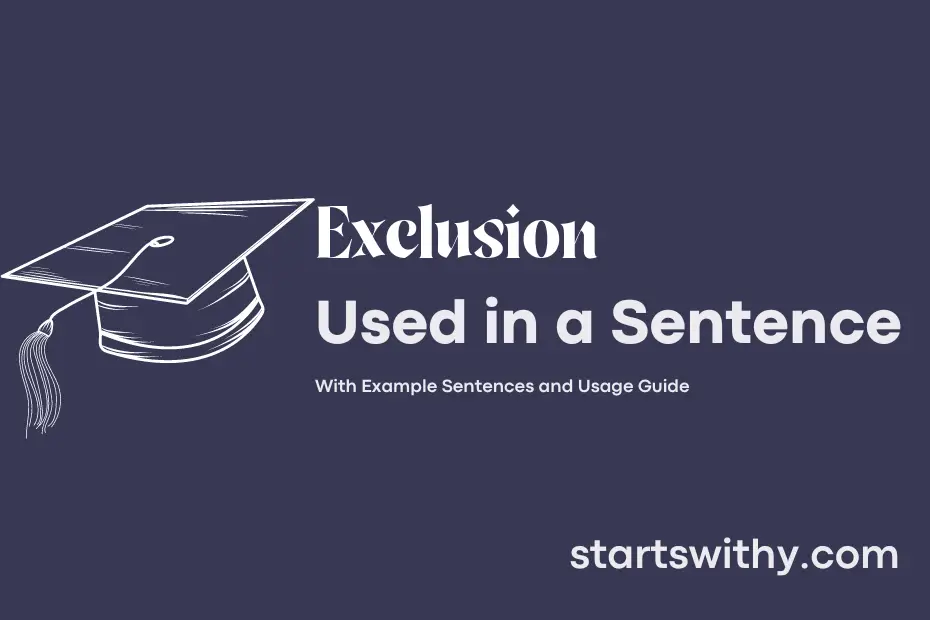Exclusion is the act of deliberately leaving someone or something out of a group or an activity. It can manifest in various social settings, such as schools, workplaces, or social gatherings, and is often associated with feelings of rejection and isolation.
This form of discrimination can have detrimental effects on mental health and overall well-being. Understanding the impact of exclusion is crucial in creating inclusive environments where everyone feels valued and accepted.
7 Examples Of Exclusion Used In a Sentence For Kids
- Exclusion means someone is left out.
- It is not nice to practice exclusion.
- Everyone should be included, and there should be no exclusion.
- We should always try to avoid exclusion.
- Being kind means not causing exclusion.
- Let’s make sure there is no exclusion in our games.
- Exclusion can hurt people’s feelings.
14 Sentences with Exclusion Examples
- Exclusion from the college fest was disappointing for the students who didn’t meet the eligibility criteria.
- The professor’s policy of exclusion for late submissions served as a good reminder for students to be punctual with their assignments.
- The strict dress code at the college’s annual event led to the exclusion of students who didn’t adhere to the guidelines.
- The group project had a rule of exclusion for members who repeatedly missed deadlines without valid reasons.
- The scholarship committee faced criticism for its exclusion of certain deserving candidates based on unclear criteria.
- The sports team faced exclusion from the upcoming tournament due to insufficient players for the event.
- The guest lecturer emphasized the importance of avoiding exclusion by actively participating in class discussions.
- The library’s policy of exclusion for students with overdue books motivated individuals to return borrowed materials promptly.
- The student organization faced backlash for its perceived exclusion of minority groups in its leadership positions.
- The college council’s decision to implement a new attendance policy led to the exclusion of many students from appearing for final exams.
- The campus club’s exclusive membership policy resulted in the exclusion of interested students who didn’t fit the specific criteria.
- The debate competition had clear rules about exclusion for participants who violated the established guidelines.
- The counseling center provided support to students facing exclusion from social events and encouraged them to seek assistance.
- The academic committee’s decision to uphold exclusion for plagiarism offenses highlighted the importance of academic integrity in the college.
How To Use Exclusion in Sentences?
To use Exclusion in a sentence, first identify the word or concept that you want to exclude from a group or list. Then, make sure to clearly state that the specific item is not included or considered in the context you are discussing.
For example, you could say: “I love all fruits, excluding bananas because I am allergic to them.” In this sentence, the word “excluding” is used to indicate that bananas are the only fruits not included in the speaker’s love for fruits.
Another example could be: “The party is open to all employees, except for interns.” Here, the word “except” is used to show that interns are the only group of people who are not invited to the party.
Remember to place the word indicating exclusion (excluding, except, but, other than, etc.) after the main part of the sentence, and before the specific item that is being excluded. This will help make your statement clear and easy to understand for your audience.
Practicing using Exclusion in sentences will help you become more confident in expressing your ideas and preferences, and will also make your writing more precise.
Conclusion
In summary, sentences with exclusion are used to emphasize what is not included or allowed in a particular situation. By pointing out the boundaries or limitations, these sentences help define what is acceptable or relevant. For example, “Participants under 18 are not eligible for the competition,” clearly states who is excluded from participating.
Utilizing sentences with exclusion is essential for setting boundaries, maintaining clarity, and ensuring fairness in various contexts, such as rules, regulations, and eligibility criteria. These sentences serve a crucial role in clearly defining parameters, ensuring proper understanding, and avoiding confusion or misunderstandings.



